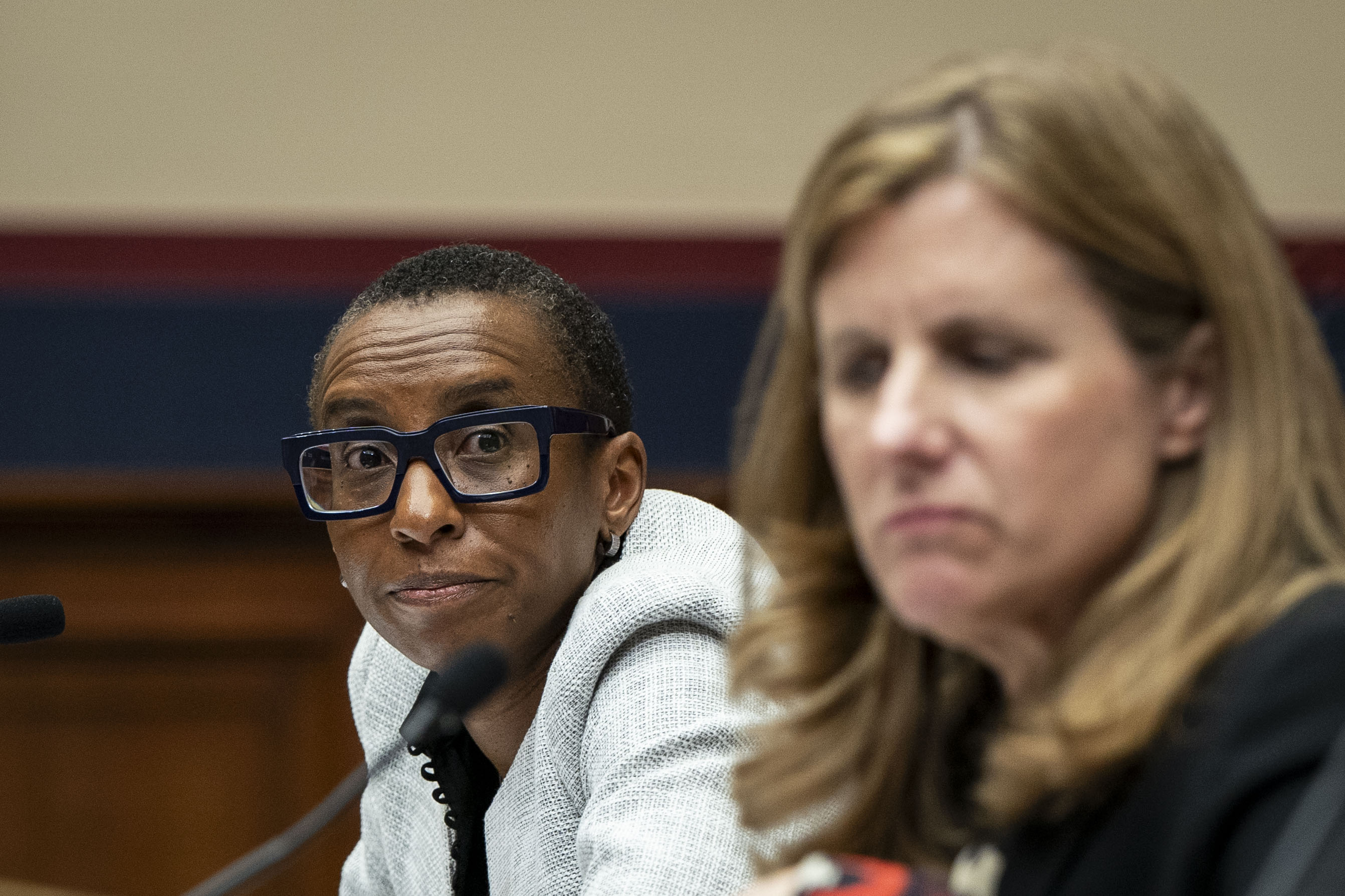Ivy League presidents scramble to fix congressional antisemitism flap
After hedging when asked whether 'calling for the genocide of Jews' constitutes bullying, three university leaders shift into damage control


A free daily email with the biggest news stories of the day – and the best features from TheWeek.com
You are now subscribed
Your newsletter sign-up was successful
Three of the nation's most prominent university presidents are scrambling to address the growing furor over their appearance at a House Committee on Education and the Workforce hearing over instances of antisemitism on college campuses. While Harvard University president Claudine Gay, University of Pennsylvania president Liz Magill and Massachusetts Institute of Technology president Sally Kornbluth spent hours on Tuesday testifying about their schools' respective policies around discrimination, antisemitism, and Islamophobia within the context of the ongoing war between Israel and Hamas in Gaza, several exchanges in particular have become a flash point for — and a Rorschach test of — allegations that some of the highest regarded educational institutions tolerate violent rhetoric toward Jewish students.
Asked whether "calling for the genocide of Jews violate[s] Penn's rules or code of conduct, yes or no?" by Rep. Elise Stefanik (R-N.Y.), Magill initially equivocated, parsing the differences between speech and action, ultimately telling Stefanik that it's a "context-dependent decision."

At another point in the hearing, Harvard's Gay expressed personal abhorrence to certain terms associated with pro-Palestinian movements which have been interpreted by some as advocating antisemitism and violence against Jewish people. Like Magill, however, Gay hedged on whether such instances expressly warranted action on the part of the university.
The Week
Escape your echo chamber. Get the facts behind the news, plus analysis from multiple perspectives.

Sign up for The Week's Free Newsletters
From our morning news briefing to a weekly Good News Newsletter, get the best of The Week delivered directly to your inbox.
From our morning news briefing to a weekly Good News Newsletter, get the best of The Week delivered directly to your inbox.

Tuesday's contentious hearings came as the Education Department launched a suite of investigations into alleged instances of campus antisemitism and Islamophobia, the "first investigations of this kind by the Department of Education since the October 7 Hamas terror attack on Israel," according to CNN.
'Lawyerly responses to a tricky question'
In a short video posted after Tuesday's appearance, Magill offered a direct mea culpa for focusing on Penn's "longstanding policies aligned with the U.S. Constitution" instead of "the irrefutable fact that a call for genocide of Jewish people is a call for some of the most terrible violence human beings can perpetrate." In order to "get it right," Magill promised to "convene a process" for examining her school's existing policies.
A Video Message from President Liz Magill pic.twitter.com/GlPE3QZU4PDecember 6, 2023
While First Amendment advocates hailed the university presidents' statements as "legally correct," their "lawyerly responses to a tricky question involving free speech" ultimately "failed to meet the political moment" for many observers, according to The New York Times.
While House Republicans' intent "from the outset was to publicly ridicule the presidents," the trio of witnesses "managed to underwhelm, alienate and incense much of the U.S. Jewish community" Haaretz reporter Ben Samuels wrote, describing the presidents' effort to "answer the often hostile grilling with nuanced answers."
A free daily email with the biggest news stories of the day – and the best features from TheWeek.com
Whether undone by a lawyerly commitment to nuance or not, the presidents' House testimony earned rebukes from across the political spectrum, including from the White House, which stressed that calls for genocide of any kind are "monstrous and antithetical to everything we represent as a country." Billionaire hedge fund manager Bill Ackman, a Harvard graduate whose thesis focused on the Jewish and Asian American experience at the prestigious school, called on all three presidents to "resign in disgrace," while Pennsylvania Gov. Josh Shapiro, a Democrat, called Magill's responses "unacceptable."
'Think critically about who they want [...] as their advocates'
Allowing that he was "no fan" of Rep. Stefanik, liberal legal scholar Laurence Tribe, a professor emeritus at Harvard Law, nevertheless lauded the congresswoman for her performance on Tuesday, writing that Gay's "hesitant, formulaic, and bizarrely evasive answers were deeply troubling."
I’m no fan of @RepStefanik but I’m with her here. Claudine Gay’s hesitant, formulaic, and bizarrely evasive answers were deeply troubling to me and many of my colleagues, students, and friends: https://t.co/HEzQ0sLKkADecember 6, 2023
Tribe's tempered endorsement notwithstanding, those hailing Stefanik would be well served to "remember their new leading advocate has platformed some of the most vile antisemitic conspiracy theories of recent memory," Haaretz's Samuels wrote in a separate essay highlighting the congresswoman's endorsement of the "great replacement" theory that inspired the 2018 mass murder at Pittsburgh's Tree of Life synagogue. As chair of the House Republican Conference, Stefanik has "encouraged the false conflation and generalization of any and all criticism of Israel with antisemitism, all while failing to address antisemitism within her own party."
Journalist Emily Tamkin agreed, writing on X, formerly Twitter, that "university presidents [should] be able to condemn antisemitism." But Tamkin, author of Bad Jews: A HIstory of American Jewish Politics and Identities, added that they should be able to do so "while calling out bad faith conflations, gotchas, etc from bad faith actors."
Rafi Schwartz has worked as a politics writer at The Week since 2022, where he covers elections, Congress and the White House. He was previously a contributing writer with Mic focusing largely on politics, a senior writer with Splinter News, a staff writer for Fusion's news lab, and the managing editor of Heeb Magazine, a Jewish life and culture publication. Rafi's work has appeared in Rolling Stone, GOOD and The Forward, among others.
-
 The ‘ravenous’ demand for Cornish minerals
The ‘ravenous’ demand for Cornish mineralsUnder the Radar Growing need for critical minerals to power tech has intensified ‘appetite’ for lithium, which could be a ‘huge boon’ for local economy
-
 Why are election experts taking Trump’s midterm threats seriously?
Why are election experts taking Trump’s midterm threats seriously?IN THE SPOTLIGHT As the president muses about polling place deployments and a centralized electoral system aimed at one-party control, lawmakers are taking this administration at its word
-
 ‘Restaurateurs have become millionaires’
‘Restaurateurs have become millionaires’Instant Opinion Opinion, comment and editorials of the day
-
 ‘Poor time management isn’t just an inconvenience’
‘Poor time management isn’t just an inconvenience’Instant Opinion Opinion, comment and editorials of the day
-
 ‘The forces he united still shape the Democratic Party’
‘The forces he united still shape the Democratic Party’Instant Opinion Opinion, comment and editorials of the day
-
 How are Democrats trying to reform ICE?
How are Democrats trying to reform ICE?Today’s Big Question Democratic leadership has put forth several demands for the agency
-
 Big-time money squabbles: the conflict over California’s proposed billionaire tax
Big-time money squabbles: the conflict over California’s proposed billionaire taxTalking Points Californians worth more than $1.1 billion would pay a one-time 5% tax
-
 Trump links funding to name on Penn Station
Trump links funding to name on Penn StationSpeed Read Trump “can restart the funding with a snap of his fingers,” a Schumer insider said
-
 Trump reclassifies 50,000 federal jobs to ease firings
Trump reclassifies 50,000 federal jobs to ease firingsSpeed Read The rule strips longstanding job protections from federal workers
-
 ‘The censorious effect is the same, even if deployed covertly’
‘The censorious effect is the same, even if deployed covertly’Instant Opinion Opinion, comment and editorials of the day
-
 Supreme Court upholds California gerrymander
Supreme Court upholds California gerrymanderSpeed Read The emergency docket order had no dissents from the court
